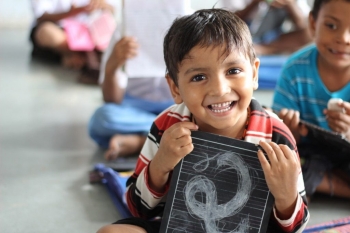
.png) Dr Suresh Mathew
Dr Suresh Mathew

‘Do not cut off the branch you are sitting’ seems to be the best adage to characterize the recent decision of the Central Government to discontinue the scholarship scheme to students, from Class I to VIII, of poor families of minority communities. It has been restricted to students of Classes IX and X from the next academic year. The scheme is run by the Union Ministry of Minority Affairs. On the one hand, the government vigorously propagates with much fanfare the slogan ‘Education for All’, but on the other it puts a spoke in its own wheel of efforts to provide education to children from some of the most marginalized and neglected sections of the society. These scholarships were instituted after the Sachar Committee, which looked into the socio-economic-educational status of the Muslims, came out with the report that children from the community were among the most educationally backward in the country; it further submitted that in many cases they lag behind the children from Scheduled Castes and Scheduled Tribes.
The data given by the government testify that the scheme had benefitted around 5.20 crore students in the last seven years. This included 3.36 crore Muslims, 53.9 lakh Christians, 35 lakh Sikhs and 12 lakh Buddhists. The scheme enables a day scholar to get Rs.225 and a hosteller Rs. 525 per month. This is apart from the Rs. 750 and Rs. 1000 respectively for buying books per year. Despite the reported loopholes like leak in the system and diversion of the scholarship money to wrong hands in some cases, the scheme has benefitted quite a number of poor families in supporting the education of their children, who would have otherwise dropped out of the education field.
The government’s argument to partially scrap the scheme is technical. It says that since education up to Class 8 is free in government schools, there is no need to give them any scholarship money. Another contention is that the scholarship scheme for Scheduled Class and Scheduled Tribe students is only for students of Classes 9 and 10. These are nothing but lame arguments. Free education is available only for students in government schools and those admitted under EWS scheme in private schools. But what about the lakhs of students who are unable to go to government schools for many reasons? What about the students who are left out of admission in private schools under the EWS scheme? How will they reach Class 9 to avail the benefits of the government scheme?
In fact, the scheme was introduced with the avowed purpose of lending a helping hand to the children of the marginalized sections of minority communities; it was meant to lift them to a level-playing field in education; it was aimed at reducing the drop-out rates of students at the school-level. It worked as a supportive mechanism even for those students who were getting free education as there are many other expenses the parents have to take care of. The scheme acted as a booster dose to encourage enrolment and attendance in schools. According to available data, the central and state governments together have to shell out around Rs. 2000 crores per year on the scheme which is nothing but peanuts for them. Watering down the scheme is against the government’s own slogan of ‘Education for All’.